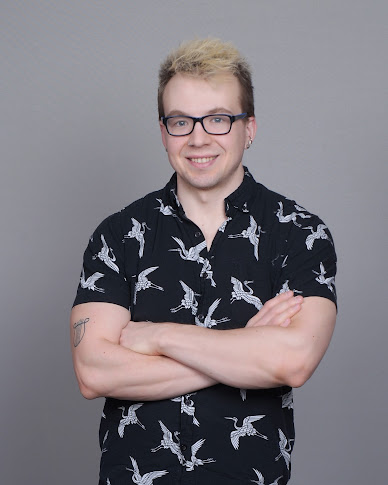Matthew Kosinski is a poet, socialist, and occultist from Philadelphia.
Alone in the White Marble City is available from
New Delta Review.
Your Human Shape is available from Broken Sleep Books.
What are you working on?
I’m working on a couple of things right now. The first is a series of poems grouped under the tentative title of I Want to Eat My Clone. The idea arose out of a discussion I had with a couple of friends a while back. Some years ago, there was a somewhat famous internet story about a man who had his foot amputated following a motor vehicle accident. On a lark, he and his friends decided to cook and eat the amputated foot meat, figuring it was their once-in-a-lifetime shot at trying some ethical cannibalism.
My friends and I were discussing this story, considering whether we, too, would eat the foot if we were in that scenario. I’m pretty confident that I would, and I said as much. So one of my friends decides to escalate. He asks us, “Okay, you’d eat the foot. But how about this: Let’s say one day you woke up and walked into your kitchen and there, on the ground, was the deceased body of a perfect clone of yourself. Would you eat it?”
I’m less confident that I’d eat the clone, if only because that’s a lot more meat than a single foot. But I like the thought experiment.
At the time I was also reading a lot about quantum mechanics – specifically, Philip Ball’s Beyond Weird – and I was really interested in John Archibald Wheeler’s “it from bit” theory, which basically proposes that the universe exists, at a fundamental level, as information. The physical world we inhabit essentially arises from the process of observing and interpreting that information. I’m greatly simplifying here, but under Wheeler’s theory, one can consider the human body a great big observational instrument: It moves through the world recording data, processing it, and rendering it legible as a physical environment.
And so when my friend proposed this thought experiment – eating one’s clone – I thought about it in light of the “it from bit” theory. If the human body is an observational instrument, then perhaps by eating it, one could gain access to the raw universal data it’s been processing. That data has to be stored somewhere, right? Like eating a computer to learn what’s on its hard drive.
Thus we have I Want to Eat My Clone, a series of poems about an amateur scientist discovering his own clone and deciding to eat it, piece by piece, in order to access the raw universal data it might be hiding. Each poem in the series corresponds to a different body part: eyes, heart, fingers, lungs, genitals, etc.
The other project I’m working on is what I’m calling the “poetic equivalent of a Metroidvania.” For those who don’t know, “Metroidvania” refers to a genre of two-dimensional platforming video games that emphasize exploration. A Metroidvania takes place in one big connected world, and you, as a player, have to explore that world, filling out a map as you go along.
I love these games for the way they tell stories through environmental cues and flavor text rather than narrative exposition; the player is an active participant in uncovering the story as they scour every inch of the world for hidden treasures, secret passages, and new areas. I’m thinking about, for example, Ender Lilies, where the player learns more about the protagonist’s origins by stumbling upon a secret laboratory. Or Blasphemous, where every item you pick up has an attached bit of lore that sheds some light on the post-apocalyptic world you’re traversing.
So I’ve become a bit obsessed with translating that kind of experiential, fragmented, exploration-heavy storytelling into a poetic framework. I can’t say I’ve figured out just yet how I’ll do it, but I know it’s going to rely on the visual composition of the poem. I want the poem to feel like you’re filling out a Metroidvania map as you move through it. And I’ve got a loose narrative right now, something revolving around a dystopian internet jail called the “paranet.” But all in all, this one’s still a bit embryonic.




